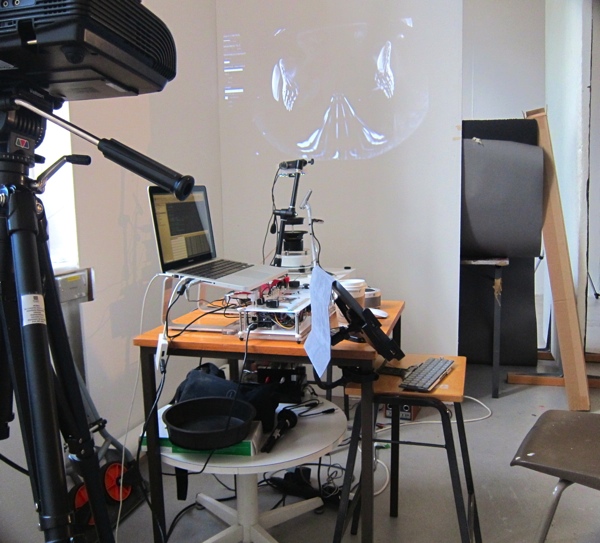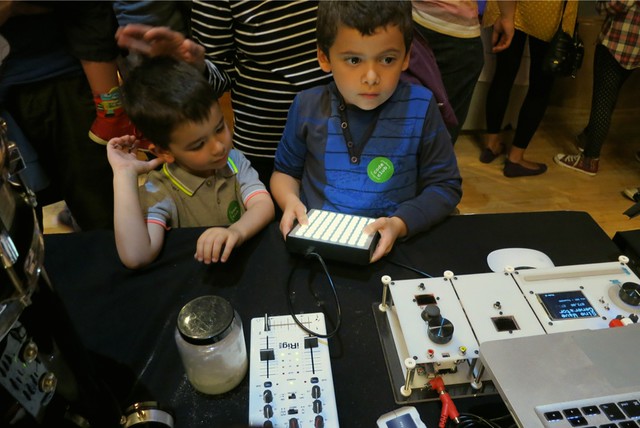PPR Studio Week
The members of the PPR group ran a Studio Week 20-24th August 2012 – an opportunity to focus on our practice while working alongside colleagues in a shared space and also engage in group discussion and critical reflection.

Generally the emphasis was on informal wandering into each others’ spaces and ongoing conversations, critique and dialogue with each other and supervisors – although we also planned for more formal gatherings and group discussion during the week.
At a PPR planning meeting we agreed to each think about and share the following with the group:
What are we each hoping to achieve for the week?
Where are we each up to with our work?
Each of us should try and respond to – and be ready share with the group – an element of our PhD orientated practice that seems to be necessitated by our research. Is there a particular idea, suggested through our literature revue or other research to date, that not only seems important to our own developing thesis, but that we each feel can only be explored further through our practice. Where further reading and research into this idea won’t answer the questions we have – only by doing, by practising will we be able to discover/uncover answers to the questions we have. Can we identify an aspect of our PhD where the practice actually IS the research.
Each of us to identify a handful of artistic ideas/tenets/axioms that seem central to our individual practice. Share these with the group and discuss/unpack. Write them on a Post-It note and place them on an A1 piece of paper. Try to find connections/correspondences with ideas from others in the group. Rearrange/group/connect these Post-Its. Create a group mapping/network/web of ideas. Do this on Tuesday morning when Emily is available.
Ways to document the week – i.e. set up a Tumblog so we can create a running document.
Sensous Knowledge – group discussion on the first day about the Sensuous Knowledge call we’ve submitted to and how we can respond to this specifically during the week.
Each of us to invite Supervisory teams – as and when they’re available is fine.
Group ‘Show and Tell’ on Friday. What have we realised – practically and critically – through the activity of the week?
My responses to some of the questions above…
What am I hoping to achieve?
I’m planning to spend some concerted time exploring the qualitative – rather than quantitative (i.e. working systematically through a list of things to do) – aspects of my practice… of looking at the aesthetics and perceptual qualities of the outputs of one of the devices I’ve made, trying to work out what it reveals about sound and it’s corresponding visual pattern that I haven’t quite appreciated previously.
If it comes together quickly enough I’m going to try and compose a simple cymatic audiovisual piece using it…
I’m planning to document this work in better quality and with more attention to style than I’ve done previously…
Specifically I’m intending to:
- focus on working with liquids and low frequencies;
- use the SWG v4 ‘octave’ mode – to keep the audible audio output minimal;
- use Tiction to programme cymatic melodies over OSC;
- capture video via iPEVO Point2View, PS3 Eye and Firefly MV;
- explore more ideas for processing this video capture in real time;
- glycerol – Lissajous figures? 3D Harmonium?;
- other liquids?;
- try capturing some decent documentation with the Canon A640.
Key characteristics of my practice
I have both an artistic bent and an aptitude for science, so I’m interested in that area of interdisciplinary activity commonly termed Sci-Art where these practices intersect and interact.
I’m interested in exploring and revealing the patterns that surround us – those underlying, non-explicit, innate (mathematical, computational, sonic) motifs that underpin the natural world but are frequently hidden from our senses – often expressed through rich and sonorous musical traditions and other more time-honored forms of creative expression. Through my practice I attempt to understand and reinterpret these motifs conceptually and creatively and then re-stage them in new environments.
I’m focused on sound as medium with the visual aspect and the physical form of the work as supporting but secondary.
I’m drawn to elegant design and endeavour to (re)capture a sense of craft and workmanship in the work I produce.
I work with technology but aim for transparency – I try hard to keep the subject of the work to the fore and make the mechanisms – including the custom-coded software architectures and hand-fabricated mechanical and electronic workings – visible but unobtrusive. I aim for simplicity, playfulness, humour and above all agency – “action or intervention, esp. such as to produce a particular effect”.
I’m intrigued by the creative potential offered through the innate processes of perception. Is it possible, with artistic intent, to manipulate a multi-modal percept – a ‘multi-sensory object of perception’?
I’m trying to master “the art of making the unsought finding” and introduce more serendipity into my practice – not just in the hope of the ‘happy accident’ but to open myself to the possibility of the latent potentialities within my work and even to be systematic about searching for the ‘unfound’.
Reflections
Lewis Sykes – Day 2 reflections – posted to Tumblog (unfortunately lost the link)
So after two days together in the studio I have to ask the question “Why haven’t we done this before?” It seems such a natural thing to do – for Practice as Research postgraduates to spend time working on aspects of individual practical research in a shared space – and through this environment talking with others, sharing ideas, offering and receiving perspectives. But equally it strikes me that had we not taken the initiative, we could quite easily have spent three years of postgraduate research barely seeing anything of each other’s artistic processes.
This is why I think one of our stated aims for the week – to share an element of our PhD orientated practice that seems to be necessitated by our research, where only by doing, by practising will we be able to discover/uncover answers to the questions we have, to identify an aspect of our PhD where the practice actually IS the research – is really important. If the practice in practice as research is going to achieve credibility as a valid means for extending knowledge we need to spend more time creating environments like the Studio Week where we can talk with others, share ideas, offer and receive perspectives about issues like this.
Post – Studio Week reflections
This is written sometime after the week itself… but I think it reflects my feelings and thoughts at the time sufficiently well.
Actually my initial enthusiasm for the Studio Week evaporated as the week progressed and I ended it feeling a bit frustrated to be honest.
I quickly missed my studio and all my tools, equipment and resources. By Day 3 I was struggling to get the results I wanted because of failings in the design of my prototype device. Had I been working in my studio I would have simply adjusted and tweaked those elements that were proving troublesome… but with only the equipment I’d managed to take with me I was stymied.
This seemed to be in contrast with most of the other PPR members who actually settled into their methodologies more and more as the week progressed. Some even carried on into the following week.
Although I’d often suspected as much, I began to appreciate that my practice was quite different than many of my PPR colleagues – far more experimental, process-driven and iterative in comparison to theirs. I began to feel this differentiation quite sharply and this was something of a watershed realisation for me.
The PPR Group had always been a diverse grouping of postgrads with very different research foci coming together under a common umbrella – of all being involved in undertaking a PhD. But two years in, this ‘celebration of difference’ was becoming less and less relevant for me. I had a firm grasp on what undertaking a PhD meant for me. What I wanted was colleagues with whom I could discuss the intricacies of my research… to think aloud, get critical feedback and bounce around ideas about my specific areas of interest – and it was becoming clear to me that this wasn’t the PPR group.
Also the critical feedback and group discussion exercises that we had planned never materialised. We did meet up to discuss and share on the first day – but this quickly fizzled out. Personally, I’d really wanted this more formal discussion – thinking that our differences would raise interesting alternative perspectives and thought-provoking ideas – but it seemed far less important to the others who were happy with the informality and with getting on with their work. Fair enough – but not quite my bag…
… and Artist Details – download as PDF from my public WebDisk or read on via Scribd….
There’s a follow up PPR Studio Week – Notes + Reflections post on my Tumblr Digital Sketchbook.

